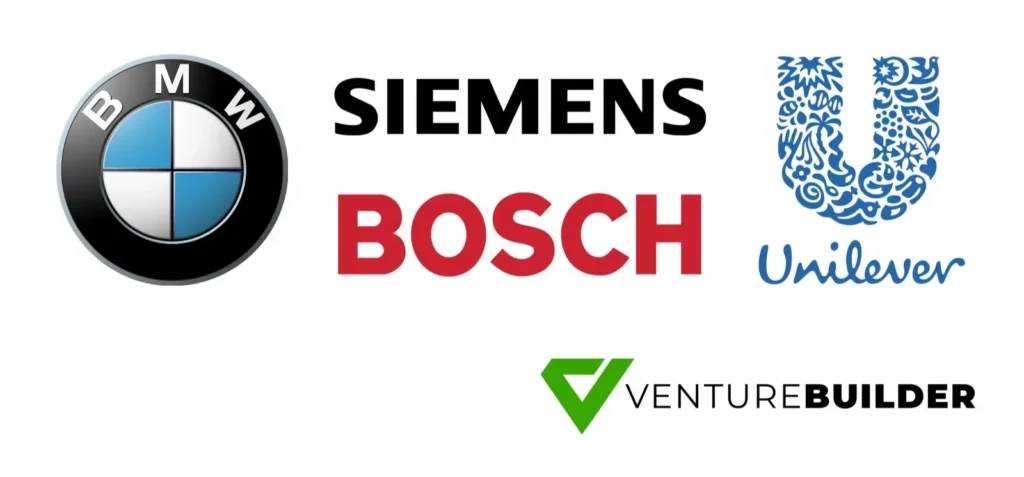Detailed accounts of successful partnerships between corporates and startups through the Venture Client model, highlighting key strategies and outcomes.
The Venture Client model has emerged as a powerful strategy for corporates to innovate by partnering with startups. This model allows companies to become clients of startups’ products or services, providing early market traction and valuable feedback while benefiting from cutting-edge innovations. Below, we explore detailed accounts of successful partnerships that exemplify the potential of the Venture Client model.

1. BMW and Brighteye Ventures: Driving Innovation in Automotive Technology
Overview
BMW’s startup engagement unit, BMW Startup Garage, exemplifies the Venture Client model. One notable success story involves their partnership with Brighteye Ventures, a startup specializing in advanced AI-based driver assistance systems.
Key Strategies
Initial Collaboration: BMW identified Brighteye Ventures through their rigorous scouting process, focusing on startups that could address specific challenges in automotive technology. Brighteye was invited to join the BMW Startup Garage program, which provides a structured framework for collaboration.
Product Integration: Brighteye’s AI-based driver assistance system was integrated into BMW’s prototype vehicles. This phase involved close cooperation between BMW’s engineering team and Brighteye’s developers to ensure seamless integration and optimal performance.
Real-World Testing: The integrated system was subjected to extensive testing under various driving conditions. This allowed BMW to evaluate the system’s effectiveness and provided Brighteye with valuable real-world feedback.
Scale-Up: Following successful trials, BMW decided to incorporate Brighteye’s system into their production vehicles. This decision was based on the system’s proven ability to enhance vehicle safety and driver experience.
Outcomes
Enhanced Product: BMW’s vehicles now feature state-of-the-art AI-driven safety systems, setting new standards in the automotive industry.
Market Validation: Brighteye Ventures gained significant credibility and market validation, which was instrumental in attracting further investment and expanding their market presence.
Speed to Market: By leveraging Brighteye’s innovative technology, BMW accelerated its innovation cycle, bringing new features to market faster than competitors.
2. Bosch and Teralytics: Revolutionizing Urban Mobility
Overview
Bosch, a global engineering and technology company, partnered with Teralytics, a startup specializing in mobility analytics, to address urban congestion and improve mobility solutions.
Key Strategies
Pilot Projects: Bosch selected several smart city initiatives to pilot Teralytics’ data analytics platform. These projects focused on gathering and analyzing data on urban mobility patterns.
Collaborative Development: Bosch and Teralytics worked closely to customize the analytics tools, ensuring they met the specific needs of each project. This iterative process involved regular feedback sessions and adjustments.
Data Utilization: Bosch utilized insights from Teralytics’ platform to optimize traffic management systems and public transportation schedules. The data-driven approach enabled more efficient use of urban infrastructure.
Outcomes
Improved Mobility: Cities where the solution was deployed saw a significant reduction in traffic congestion and improved public transportation efficiency.
New Business Opportunities: Teralytics expanded its client base, using the success of its collaboration with Bosch as a key selling point. This led to increased adoption of their platform by other cities and organizations.
Strategic Growth: Bosch positioned itself as a leader in smart city solutions, offering advanced mobility analytics as part of its portfolio.
3. Siemens and Konux: Enhancing Railway Infrastructure
Overview
Siemens, a leading industrial manufacturing company, leveraged the Venture Client model to enhance railway infrastructure by partnering with Konux, a startup providing smart sensor systems and AI-based analytics for railways.
Key Strategies
Proof of Concept: Siemens identified Konux as a promising partner through its open innovation program. They initiated a proof of concept to test Konux’s sensor technology on their railway infrastructure.
Feedback Loop: Siemens’ engineering team provided continuous feedback to Konux, helping them refine their product based on real-world performance data.
Deployment: After successful proof of concept and iterative improvements, Siemens integrated Konux’s solutions into their service offerings for railway operators. This included predictive maintenance and real-time monitoring systems.
Outcomes
Operational Efficiency: Rail operators using Siemens’ enhanced infrastructure reported improved maintenance schedules, reduced downtimes, and significant cost savings.
Market Leadership: Konux established itself as a key player in railway technology, gaining recognition and new business opportunities.
Long-Term Partnership: Siemens and Konux continue to collaborate on further innovations, demonstrating the long-term potential of the Venture Client model.
4. Unilever and Algama: Innovating Sustainable Food Solutions
Overview
Unilever, a multinational consumer goods company, partnered with Algama, a startup developing algae-based food products, to innovate in the sustainable food sector.
Key Strategies
Product Trials: Unilever conducted extensive trials of Algama’s algae-based ingredients across various product lines. These trials aimed to assess the feasibility of incorporating algae into existing and new products.
Consumer Testing: Both companies collaborated on consumer testing to ensure the new products met market expectations. This involved focus groups, taste tests, and surveys to gather comprehensive feedback.
Co-Branding: Successful products were co-branded, leveraging Unilever’s market presence and Algama’s innovative appeal. This co-branding strategy helped in marketing the products to a broader audience.
Outcomes
Sustainable Products: Unilever launched new, sustainable food products that resonated well with eco-conscious consumers. These products helped Unilever meet its sustainability goals and appeal to a growing segment of environmentally aware consumers.
Market Expansion: Algama gained access to Unilever’s vast distribution network, significantly boosting its market reach and sales. The partnership also enhanced Algama’s reputation in the food industry.
Sustainability Leadership: Unilever reinforced its commitment to sustainability, enhancing its brand reputation and attracting positive attention from stakeholders and consumers alike.
“The Venture Client model creates symbiotic partnerships that drive faster innovation, real-world validation, and market traction—without the overhead of equity deals.”
Conclusion
The Venture Client model fosters a symbiotic relationship between corporates and startups, driving innovation and providing mutual benefits. As illustrated by the success stories of BMW, Bosch, Siemens, and Unilever, this approach can lead to enhanced products, operational efficiencies, market validation for startups, and accelerated innovation cycles. By embracing the Venture Client model, corporates can stay at the forefront of technological advancements, while startups gain invaluable market opportunities and resources to scale their solutions. This model not only propels individual success stories but also contributes to broader industry advancements and societal benefits.

